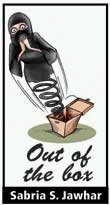Monday, 14 August 2006
By Sabria S. Jawhar
The Saudi Gazette
JEDDAH
WHEN the Saudi government modified its criminal justice system two years ago, it emphasized its continuing eagerness to carry out justice in a way that resolves criminal cases with absolute certainty in the light of evidence presented. It also emphasized its commitment to comply with the laws and regulations that protect human rights in the light of Shariah.
However, there are still some complaints from the families of those convicted, complaints largely about the laxity and negligence of some officials rather than the system itself.
Hussain Johar, a Burmese national who lives in Makkah, said his family escaped from their homeland to Saudi Arabia looking for justice and security that they lacked back home.
“We escaped from our home due to the persecution of Burmese by the military junta, something that is well-known not only to the Saudi government but also to the world,” he said.
Johar said his family is a respectful business family from Burma that has been working and living in Saudi Arabia for quite a long time. To him, life was almost perfect till Monday, Jul. 3, 2006, when he paid a visit to his nephew, Nezam Kamal Uddin, a computer technician in Jeddah.
That day, while Johar was checking the Internet his nephew closed the doors of the shop where he worked and five men came in. Four of them, he said, were in plain clothes, while the fifth wore a Saudi Telecom uniform. The men entered the shop, he explained, and asked him whether he worked there. They took his Iqama and approached his nephew to ask about an Internet-telephone they found in the shop.
“After about an hour-long search, my nephew was hand-cuffed and taken away to undisclosed location along with the Internet-telephone set that they found,” he said.
Johar was shocked because to the best of his knowledge, his nephew did not engage in any illegal activities. On the contrary, he was well known for being a good technician with customers from everywhere, including many government workers.
“If possessing an Internet calling device is not authorized in the Kingdom, the department concerned should have asked the sole agent instead of detaining workers like my nephew [Nezam],” he said.
The telephone set however, he added, was sold legally in the Kingdom and is frequently advertised in the Al-Wasaila weekly.
But that was not Johar’s main complaint. Actually, he was complaining about the legal procedures his nephew had gone through, starting with the arrest and then his detention. For instance, he said, even though he was Nezam’s guardian, he was not notified about the allegations during or after the arrest. The next afternoon, Johar said, he rushed to the police station to find out the truth to follow the required procedures. There, he saw Nezam in the investigation room but he was denied any access to him.
When the investigation was over, Johar explained, a police officer asked him to go and bring a sponsor to get his nephew released. As a relative and a legal resident, Hussein offered his official papers to sponsor Nezam, but the police refused and asked for a Saudi sponsor. When Johar came back with a Saudi guarantor, the same officer then asked for someone who works for the government and owns a registered company.
By the time Johar found someone who matched those requirements, his nephew had already been taken to prison. The authorities told him that the case has not been finalized, therefore Nezam could not be released. Officers at the police station, he said, did not give any further details. Moreover, they mistreated and humiliated him, Johar alleged.
“They did not even tell me which court they took him to,” he said.
Since then Nezam has been in detention and the family has not been notified about the charges nor given any details about the case. According to Johar, Nezam has not been given access to a lawyer. He also noted a sort of blackout around the case, something that made him believe the whole case was fabricated from the beginning.
He appealed to The Saudi Gazette to tell his nephew’s story and raise the following questions: how could they carry out legal procedures, such as an investigation and court hearings, without the knowledge and presence of the suspect’s lawyer or even a family member who might cross-examine?
“How come there was no chance to justify the case in the police station or court?” he asked. “If concerned families are not allowed to meet detainees in locked police stations or in court, how can they deal with their cases?”
Johar said he asked for help from the Saudi Human Rights Association, but they told him the case was transferred to the Emirate of Makkah region and that the association can do nothing until he is sent back to the prison.
Between his confusion and shock, Johar said his family’s ultimate goal is to get the justice a person is entitled to regardless of color or race. He said he does not want to lose his faith in justice here in the cradle of Islam.
“It is my humble request to kindly help obtain fair justice in order to release my nephew and use the media to help overcome this misbehavior and maltreatment,” he said. The police could not be reached for comment.
Monday, January 1, 2007
Subscribe to:
Post Comments (Atom)


No comments:
Post a Comment